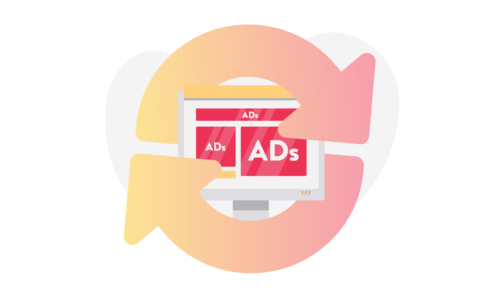Top 5 Ads Violations Publishers Commit & How to Avoid Them
For digital Publishers who use AdSense and AdExchange demand, adhering to Google policies is a “to be or not to be” matter. Our Yieldbird Team has compiled the most frequently violated policies so that you will recognise violation statuses, and know how to fix them.
Monetizing content with Google is currently the most popular, or indeed the sole, source of demand for online Publishers. Any Publisher that uses AdSense or Ad Exchange provides mandatory consent in order to comply with current Google policies. If policy-violating content is detected as having been monetized, Google has the right to penalize the Publisher.
How to check if the content on my website violates Google Publisher Policies?
All the current enforcements on your sites can be found in the Policy Center in your AdManager or AdSense panel. To find this, follow the path: Admin -> Policy -> Web policy center or App policy center. You will see there a list of sites with issues, as well as additional details: Must fix status (If the Must fix column is marked “Yes” then taking actions should be a priority), number of pages with issues, site status (explaining if the demand is only partially restricted or if the website is blocked), and the last enforcement date (reviews happen every couple of days).
How do Google Publisher Policies define content?
Anything on the monetized page or app should be considered as content – including user-generated parts (comment sections or forum threads), other advertisements and links to other sites or apps. If the content of the article is harmless, then analyze the remaining sections – such as other ad formats or comments. If the content of the article is harmless, the site may still break the policy, due to implemented low-quality ad formats or words and sentences that appear in the comments section.
What are the consequences of violations?

Depending on the seriousness and scale of the Google Publisher Policies violations, you may have to deal with the following consequences:
Restricted demand – a lower number of Advertisers will bid on your inventory (you may experience a slightly lower performance),
Revenue deduction – in some cases, described later on, Google may deduct revenue earned as a result of policy-violating activities,
Ad serving disabled – all advertising is blocked from serving, either on site-level or on an account-level.
Failing to comply with policies frequently or in an egregious way may result in the account being suspended or terminated. Publishers may submit an appeal, but recovering the account may be very difficult, or even impossible. Google may also deduct the last 60 days of the disabled partner’s earnings.
Are there justifiable situations where Google Policies can be circumvented?
During our pre-onboarding talks with Publishers, we sometimes hear or notice that a Publisher has decided to act against the policy deliberately, counting on higher profits (e.g. by having more inventory to monetize or generating more ad requests). We strongly discourage you from choosing this path.
This is a very short-sighted strategy that can permanently exclude websites in which you have invested a lot of resources from the leading source of demand.
Even if the Publisher manages to avoid the suspension of the AdSense or Ad Exchange account, it may happen, for example, that key Advertisers will give it up irretrievably (or for a long time). In the history of our cooperation with over 300 Publishers, we have seen several cases where the disappearance of significant buyers resulted in losses disproportionate to a few days of insane profits.
What are the most common violations of Google Publishers Policies?
After analyzing the frequency of individual violations, we suggest paying special attention to:

Content Plagiarism: Google is really strict about copyrights and considers such kind of infringement as unethical. It is worth adding periodic and random verifications to the standards of the editorial team, and thus check whether the content published on the website is original. There are plenty of free plagiarism checkers available online that you can start using right away, e.g. Edubirdie or Duplichecker. You can also simply copy and paste a part of the article to Google search box.
Sexual content, Shocking content, Dangerous or derogatory content: Sometimes the balance between good taste and pure nudity is not that obvious; and we have also seen many requests to remove content which was difficult to place in this category. In these cases, we always recommend the acceptance of such a decision rather than getting involved in a dispute (which can be a long process, and ultimately not worth the effort). Now that Brand Safety is becoming more important, this issue has come to the fore.
Invalid Traffic: Probably one of the most serious violations of Google Publishers Policies, which still occurs from time to time. Buying cheap traffic just so as to increase the number of ad impressions is easily detected by Google and all the revenues generated from such visits are deducted at the end of the month.
Putting an ad slot in the wrong place and too high ads density: We could write an additional article focused on the creativity of Publishers in this field, but we definitely won’t! The reason is simple – we do not want to encourage Publishers to follow such shady practices.
Crowding a lot of advertising, or undertaking any actions that are misleading for the users will not increase their loyalty. In the long run, the Publisher loses out rather than gains.
A Lack of User Consents: not having Consent Management Platforms in place or other violations to GDPR may severely impact a Publisher’s ad revenue. Quoting a passage from Google Publishers Policies: “The privacy policy must disclose to users that third parties may be placing and reading cookies on your users’ browsers, or using web beacons to collect information as a result of ad serving on your website”. And in this case, all the demand platforms are rather strict. A number of SSPs confirmed that the demand is limited for Publishers with no CMP.
We are aware that understanding, remembering and remaining in line with all Google Publishers Policies is both time consuming and complicated. Additionally, there are situations where, despite the Publisher’s best intentions, the fault for violations lies with e.g. an unverified partner supporting the Publisher with regard to monetization.
Avoiding these violations with Yieldbird
The best approach to take is to entrust yield management to partners who have ongoing contact with Google. Yieldbird as a leading Google Certified Publishing Partner receives all key policy updates in advance. And if you are looking for support, be sure to let us know.






